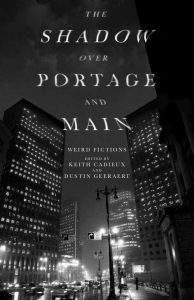Keith Cadieux is the co-editor of the weird fiction anthology The Shadow Over Portage & Main, published by Enfield & Wizenty and recently shortlisted for a Manitoba Book Award. During the day-job hours, he is the administrative coordinator for the Winnipeg International Writers Festival.
I met Keith Cadieux through the Manitoba Writers’ Guild mentorship program, where he excelled under my tutelage (possibly because he didn’t need my help).
Keith kindly included “Waiting Room,” a short story by my pseudonym Richard Crow, in The Shadow Over Portage & Main.
1. What do you want to talk about, but nobody ever asks?
I haven’t done many interviews so I’m not sure how I can offer much here. One thing I have noticed in quite a few interviews with authors is that there usually isn’t much discussion of the work itself. There are always questions about the writing process, something I value as a writer, and occasionally some talk of inspiration, but that’s usually it. There isn’t much talk of thematic fixations or intention versus the final outcome. I suppose I would like someone to ask me what are some themes I’m trying to work through with my writing. That’s something I don’t think anyone has asked me, in my limited experience.
2. What advice do you wish you’d received, but didn’t, when you first started to take writing seriously?
Probably not to take every piece of advice you’ll receive. I’ve that found picking and choosing advice, tips, criticism that particularly resonate is far more effective than having to accept something in its entirety. This is true for everything in life, really, but particularly true of writing advice. A writing manual, for instance, may offer some great thoughts, but it’s unlikely that one author will be able to take every single item in that manual and apply it effectively to their writing. Much like writing itself, you need to be a bit of a scavenger and only hold on to the bits that are pertinent or helpful to you at that moment or for that specific project.
3. What are your regular habits as a writer?
These tend to change depending on the writing project. When I first started trying to write seriously, I did so almost exclusively at night. I would put on a pot of coffee, re-read what I had written so far, making adjustments and corrections along the way, and then blast forward with new material once I’d gone through all of the older stuff. Eventually, what I had written got to be so long that this became a serious problem and I wouldn’t get to the point of writing new material. More recently, I’ve taken a tip from Stephen King’s On Writing and set a daily word count for myself. I also tend to do a lot of pacing and wandering around when I write, so I usually try to do it when I have the house to myself.
4. What is your editing process?
Usually, I write my first draft by hand. The first revision comes when I type it up, making corrections and line changes along the way. After that, my stories usually need some kind of overhaul, like new scenes or removing scenes, changes to characters, voice, narration, verb tense. So I write it out by hand again, making these substantive changes. Then, when I type it up again, it’s usually pretty lean so the only revision still needed is typographical.
5. What is your greatest difficulty as a writer?
Definitely discipline. You may have noticed that a lot of the “habits” are things that can quite easily be interfered with or thrown off track. Sometimes, having an empty house simply isn’t an option so I need to just sit down, be a little hard on myself, and get the work done.
6. How do you decide which book to read next?
This is pretty random. As I assume is the case with most writers, my to-be-read pile is a chaotic and unruly beast. It’s simply not humanly possible to read everything that I would like to in one human life span. I’m usually reading more than one book at a time and I make an effort for them to be different types of books, say a novel and a story collection, or nonfiction. Sometimes poetry but pretty rarely. I also tend to alternate between moods. I usually read mostly horror but eventually I need a break so I’ll lean into things that are more lighthearted.
7. What is your greatest single ambition?
I suppose it would be to write something that earns some real money. Like a five-figure payday from one book. In Canadian publishing, I think that’s about as ambitious as it gets.
8. Why don’t you quit?
I doubt I could, even if I wanted to. It’s definitely a compulsion. Sometimes I’m more into it, more productive, more passionate. But even during periods of low productivity or when I’m feeling disheartened, the drive to write never completely goes away. It might dulled. Usually, it comes roaring back if I’ve seen something that really gets to me, that connects to the core of me as a person somehow, and I feel a drive to write something that good, to contribute something of equal substance. Or, sometimes I encounter something so bad that I can’t shake the feeling that I could write something better and that rage drives me to actually get back to work.


